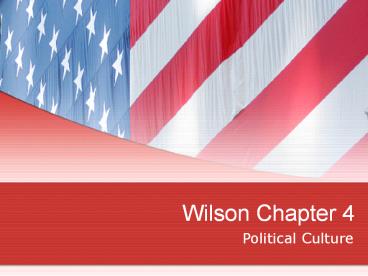Wilson Chapter 4 - PowerPoint PPT Presentation
1 / 20
Title:
Wilson Chapter 4
Description:
Wilson Chapter 4 Political Culture Objective Students will take notes and engage in a small group discussion in order to describe American Political Culture Your ... – PowerPoint PPT presentation
Number of Views:166
Avg rating:3.0/5.0
Title: Wilson Chapter 4
1
Wilson Chapter 4
- Political Culture
2
Objective
- Students will take notes and engage in a small
group discussion in order to describe American
Political Culture
3
Your First Political Memories
- What are your first political memories?
- Describe what you remember
- How old were you?
- Who was responsible for influencing you
politically? - Was the memory positive?
- What political party do you identify with? What
influenced that identification? - What role does school/family have in your
political socialization?
4
What is Political Culture?
- A patterned set of ways of thinking about how
politics and government ought to be carried out - It includes our fundamental assumptions about how
the political process should operate
5
Whats the difference between Political Culture
and Ideology?
- Political ideology refers to a more or less
consistent set of views on the policies
government ought to pursue - While culture is a much broader concept
6
What fundamental elements make up American
Political Culture?
- Liberty- Highly important. Let people do as they
please as long as they dont hurt others - Equality- to vote and chance to participate
- Democracy- government is accountable to the
people - Civic duty- Ought to take community affairs
seriously - Individual Responsibility-
7
How do we know these are our values?
- They are inferred from looking at the books we
read, films we watch, speeches and political
choices we make - Foreign observers (Like de Tocqueville)
- Opinion polls
8
If these values are important, how do we explain
behavior inconsistent with them?
- Humans often behave in an inconsistent fashion
with beliefs - But belief acts as an agent of change, slowly
forcing adherence to the value as people become
aware of the inconsistency - The American dilemma
9
Why is there so much conflict if we share a
common culture?
- Values can be irrelevant to specific
controversies - Values can be inconsistent with one another
Equality of opportunity may mean curtailing
personal liberty - Americanisms
10
How does Political Culture affect our ideas about
economics?
- We adopt the same five standards as with
political systems. - BUT We are willing to tolerate more economic
inequality - WHY? Because we emphasize Personal
responsibility and Economic Individualism we
opt for Equality of Opportunity rather than
Equality of Results
11
Who differs in this opinion?
- Civil Rights leaders and Womens rights leaders
often stress Results more than Opportunity - WHY?
12
What role does Religion play in shaping Political
Culture?
- Americans are more religious than other western
democracies - At least for non elites, Americans have become
more religious over the last two decades - Religion is attractive to Americans as much for
civic significance as spiritual significance
13
Table 4.7 Religion in Industrialized Nations,
1990-1993
14
Table 4.8 American Beliefs about Faith-Based
Programs
15
Where do we get our Political Culture?
- History
- American Revolution as a fight over liberty
- Declaration of Independence enshrines certain
values - Thus Americans have a preoccupation with the
assertion and maintenance of rights - Americans also get from our history a suspicion
and mistrust of government
16
Figure 4.1 Trust in the Federal Government,
1958-2001
- Source University of Michigan, The National
Election Studies, (September 1999), table 5A.1,
updated by Los Angeles Times, poll taken November
10-13, 2001.
17
Where do we get our Political Culture? contd
- The Constitution
- The federal system with divided political
authority provided opportunity for widespread
participation in politics
18
Origins of Political Culture, contd
- Religious Diversity with a dominant Protestant
tradition - Led to and was a product of the Constitutional
prohibition of a state sanctioned church - Protestant churches provided members with
organizational experience as they are often
organized and controlled by the members - Protestant ethic motivates civic engagement
19
How is Political Culture Transmitted?
- The process of transmitting political culture is
called Political Socialization - Primarily by the family
- Direct dissemination of values
- Structure of the family
- Equality among family members
- Greater freedom of children
20
Other means of Political Socialization
- Religious Institutions- Structure and
transmission of values - School- Through history and government classes
and political perspectives of teachers and peers - Media- TV, radio, newspapers and magazines
- Real Life Experiences- the primary influence on
adults































